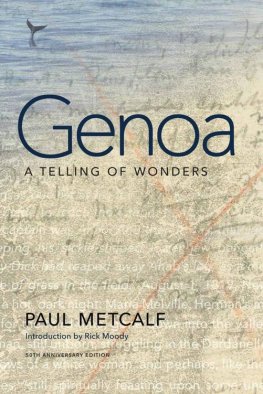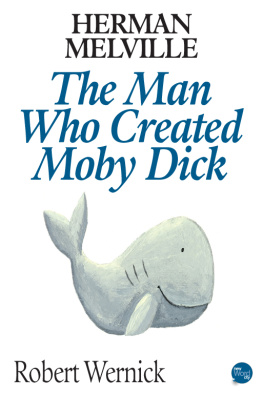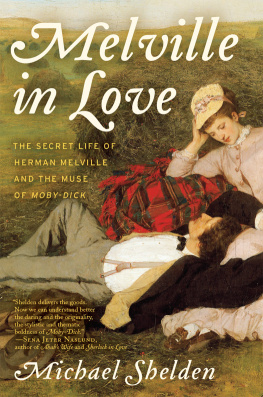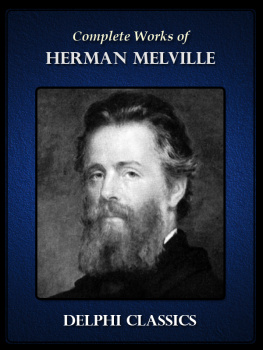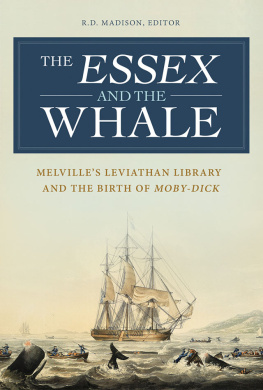Paul Metcalf
Genoa: A Telling of Wonders
INTRODUCTION BY RICK MOODY
IT IS EXTREMELY RARE, THESE DAYS, to encounter something that feels completely new. That is, most literary artifacts are pretty easy to slot into one format or the other. What a gift then, what a rare, beautiful turn of events when you stumble on a book that seems to come from some spot entirely its own. What a gift, the moment in which you must summon all your readerly resources to grasp the enormity of what you are encountering, to see the pages as they are. I can count these reading experiences on one hand, and in each case I was somehow improved, made better as a reader (Nightwood, by Djuna Barnes; Sanitorium Under the Sign of the Hourglass, by Bruno Schulz; The Recognitions, by William Gaddis; The Rings of Saturn, by W. G. Sebald; The Beetle Leg, by John Hawkes). Often the reason we read is in the hope of having these experiences of the truly, unmistakably original.
Paul Metcalf, whose novel you hold in your hands, is one of these original writers. A writer who had to follow his own path, at significant cost to himself, over many decades, without a large following. A writer who took the forms that were at hand and shook them up, recast them, repurposed them, so that a traditional approach, after beholding his model, seems almost ludicrously simplistic. A writer of the new, the surprising, the arresting.
Genoa was first published in 1965 by the Jargon Society, a small press associated with the Black Mountain school of American poetics. Its story, to the extent that it has one, is not hard to relate: a certain clubfooted, nonpracticing MD, Michael Mills, ponders his relationship with his murderous and broken sibling, Carl. In the process, he burnishes their lives and upbringing in a field of exploratory quotation, not limited to extensive quotation from the complete works of Herman Melville, a mulch of Christopher Columbuss diaries, and even a brief stopover in the literary confines of L. Ron Hubbards Dianetics.
Michael Mills, it seems, is operating upon the action of memory in such a way that memory is indistinguishable from textuality, from the sense of history as a bricolage of prior texts. Not only does this action have relevance for what the self is (brother Carl Mills, for example, may or may not have read the texts from which he quotes so voluminously), but also for how the self supposes its own character. Dr. Mills, for example, is heavily preoccupied with literature that exactly describes how a human ovum is fertilized and becomes an embryo. His medical practice exists entirely in quotation. So the question becomes: Does identity occur in the fleshy part of us or in the textual part of us?
The alert reader of Paul Metcalf will want to notice that he was related to Melville, was in fact his great-grandson, and this linkage has been somewhat fictionalized and retextualized by every major writer who has written about Genoasee, for example, Guy Davenports ravishing and passionate introduction to Metcalfs Collected Works (Coffee House Press, 1996):
The boy Paul Metcalf remembers the discovery (by Raymond M. Weaver) of the manuscript of Billy Budd in the family attic. The Metcalfs were reluctant to allow scholars to inspect Melvilles papers, and Pauls grandmother wouldnt have the name mentioned. Melville had died forgotten as an author, and considered by his family to have been a failure and a black sheep.
I am not as preoccupied with Metcalf as autobiographical generator of the text as I am interested in Metcalf as effect of quotation, as Genoa retroactively implies a Metcalf by first implying a Michael Mills, and making this Michael Mills ex nihilo from a palimpsestic surface of explorations that first requires Columbus to venture into the West Indies, and then requires Melville to set out on his own youthful maritime adventures. The American expedition, according to this braid of intertexts, is always additionally an adventure in language and reading never the topographical exploration without the ships log. And as with the alchemists, this need for exploration, while appearing outward, shipboard, always ends as an interior exploration of who we are.
Like the strands of genetic material contained in the embryonic human animal, this exploration, too, is always in the form of the helix; it always involves revolutions and convolutions in which material is reexplored and reexamined, and that is the action of Genoa itself. Over and over again, it returns to the later Columbus restless, itching for more than he had already accomplished, and without the imperial support he had earlier as well as the later Melville, the writer after the novel Moby-Dick, so much trash belonging to the worst school of bedlam literature. That later Melville, writing epic poetry in disrepute and then falling almost entirely silent, is like his great-grandson, Paul Metcalf, the writer turned real-estate agent (among his other jobs), the artist and adventurer adrift in the consideration of consciousness and literature.
Just when it appears impossible that Genoa can go further in this helixing of quotation and consciousness, with its multiple fonts and its open-ended grammatical structures, sentences that are sometimes picked up later and sometimes not; with its present action (Mills upstairs in the attic while the children watch television and quarrel a floor beneath him); and its huge, unquenchable obsessions with the past, it turns, in the last third, into something approaching an old-fashioned narrative when settling, at last, upon the grim fate of brother Carl. The prose in this portion of the novel is electrifying, exceedingly painful, full of revelation, full of incident, in a kind of storytelling that Metcalf would mostly expunge from the work that followed Genoa. But for this reader, this narrative passage roots the ethereal intertextuality of Genoa in a welcome dramatic crisis. Guy Davenport is right to refer to it as a recasting of the Bobby Greenlease kidnapping of 1953, and he is further correct to see it as the inevitably violent end of the American narrative of exploration and adventure. Michael Mills describes the crisis with his typically lovely, plainspoken free verse:
We thought that, because of his mental record, he would plead insanity, and all of us Mother, Linda, and I tried to persuade him to it, but Carl insisted against it, and such a please was never made. . instead, he took a rigorous psychiatric examination, and conned his way through it.
There are echoes in this fraternal dramatic crisis of the America that we know well from Cormac McCarthy, the America of Blood Meridian, and thereby we recall the bloody reconstruction of Faulkner, but for me the most potent pretext for the savage conclusion of Genoa is William Carlos Williamss epic of quotation and historical imagination In the American Grain, where the exploration of our continent, and its founding as a nation, is never without bloodlust. That work begins like this, with Erik the Red, settler of Greenland:
Rather the ice than their way: to take what is mine by single strength, theirs by the crookedness of their law. But they have marked me even to myself. Because I am not like them, I am evil. I cannot get my hands on it: I, murderer, outlaw, outcast even from Iceland. Because their way is the just way and my way the way of kings and my father crosses them: weaklings holding together to appear strong. But I am alone, though in Greenland.
Where does it come from, this Metcalf work of poeticized collage? The William Carlos Williams of In the American Grain and Paterson

